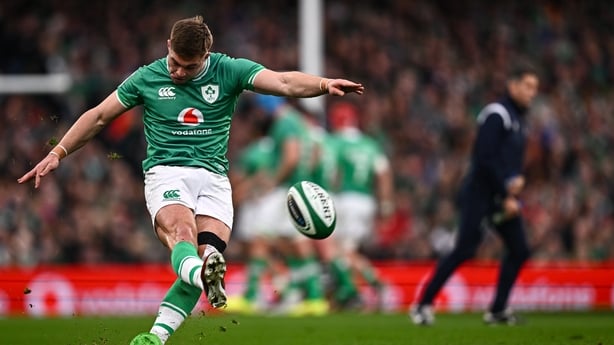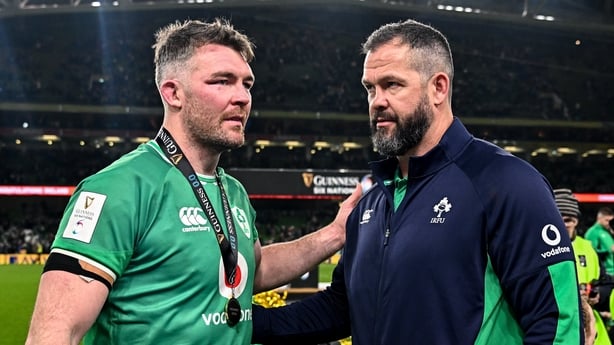Ireland were crowned the Guinness Six Nations champions on Saturday evening after a stuttering home win against Scotland.
It was certainly not Ireland's most effective attacking game and they struggled to put daylight between themselves and the Scots as a result. However, they scraped home in the end and lifted the trophy.
Ireland achieved four wins out of five, beating France away and narrowly losing to England in the last play of the game in Twickenham, which would have put them on course for back-to-back Grand Slams with the harder away fixtures.
On paper, it’s a great result. In reality, I think Ireland will look for improvements in the coming months.
Winning a trophy helps to change the narrative around this team, starting a new era for Andy Farrell and his squad. It’s important to get off to the right start, which will help to take the pressure off and allow them to develop further.
Heading into the summer tour to South Africa, I’d expect to see Ireland change things around a bit.
"Andy Farrell will be pleased at how they managed when you appreciate some of the changes that were made."
It’s imperative to understand the context that surrounded this Six Nations. Jack Crowley had big boots to fill in replacing Johnny Sexton, which he did exceptionally well. Mack Hansen and Garry Ringrose were injured, Hugo Keenan missed a chunk of games, James Ryan got injured, Calvin Nash was fully blooded, and Joe McCarthy took on his starting role.
There was enough change to warrant a few stumbles and some key personnel were unable to put their stamp on the Irish attack.
Ireland’s exits came under pressure in the last two rounds against England and Scotland. James Lowe was harried into shorter kicks or missed touch which affected them against England; and Scotland managed to crowd out the Irish kick chasers.
Ireland didn’t have a great return from their exits, something that is often a source of possession for them. In other games Hansen and Keenan have frequently gathered possession in a better spot, or Lowe has walloped a long relieving clearance kick. We didn’t see as much of that in the last two matches.
At the same time, Ireland’s counter-attack, through the first carry by Caelan Doris, became a very familiar setpiece and a worrying threat for the opposition in their run at world number one.
However, teams tended to kick 'long and on’ against Ireland, keeping the ball in play and not fearing the variations thrown at them. Maybe it’s because Ireland’s setpiece can be so threatening, but there wasn’t as much variation from their counter-attack this time around, which has been a great attacking weapon for them in the past.

The Irish attack was still fluent and possibly still the leading attack in the tournament, with some challenge from the Italian style and England once they got going.
Considering the losses of Ringrose and Hansen who help the Irish attack to find another dimension, Crowley facilitated very well in his first Six Nations at the helm.
Farrell will be pleased at how they managed when you appreciate some of the changes that were made.
As Crowley and Nash become more seasoned in green, they’ll be even more of a threat. Crowley can be lethal when he goes at the line and as he gets more comfortable, I think we’ll see him taking on even more responsibility.
Nash has also become comfortable in a distributing role at Munster, much like Hansen does when playing with Ireland. He’ll grow more and more into that role and become even more threatening in attack.
Ireland have been leaders in attacking variety and ingenuity in the last couple of seasons. When teams lead in rugby, they’re always on the front foot and they can change the landscape of the game with their variations. New Zealand have done it for years with their attacking strategies, South Africa are also top tacticians and the rest of the world tends to copy them.
Ireland have been that team when it comes to attacking variations recently and I expect things to change another bit when heading to South Africa.
I also expect them to bring in another handful of players to develop further. Keenan has proven to be almost irreplaceable, but that’s a lot of pressure to carry for one position. Mike Haley and Will Addison would both be good additions to the squad to ease that pressure.
Oli Jager is worth exploring a bit more too. I’m not suggesting that Ireland should go to South Africa without Tadhg Furlong, but you’d wonder what a break from one tour would do for the longevity of Furlong’s career. He’s still a hugely important part of the Irish squad but if we don’t develop Finlay Bealham and Jager that bit more, Furlong could struggle to corner the Irish pack for the medium to long-term future.
In terms of development, I don’t expect or want Ireland to change the squad drastically, we know at this stage that it’s not how international rugby works.

Development could simply be getting another handful of caps into McCarthy, Crowley, Nash, Ryan Baird and others.
It doesn’t need to be a complete change in personnel to see development. Some players might even need more chances to start games to play their best rugby, players like Ronan Kelleher, Bealham and Jack Conan.
Whether the next progression for Ireland will be to bed in a new captain or not seems to be in the hands of Peter O’Mahony. From the outside, it looked to be O’Mahony’s last Six Nations for Ireland. Bowing out with a championship win as captain would be a fitting testament for such a monumental career.
Understanding how much of Ireland’s approach needs to be tweaked is a hugely difficult task. There will be a fresh impetus with the addition of Andrew Goodman once Leinster finish their season, but he won’t have much of an influence until Mike Catt vacates his spot after the two-test tour.
Farrell has done an unbelievable job at giving this squad a narrative and focal point, while changing how they play the game.
I’ve no doubt that he’ll be working on this development as the players return to their clubs to compete in the URC and Champions Cup.
Watch France v Ireland in the Women's Six Nations on Saturday from 1.45pm on RTÉ2 and RTÉ Player, follow a live blog on rte.ie/sport and the RTÉ News app and listen to Saturday Sport on RTÉ Radio 1


